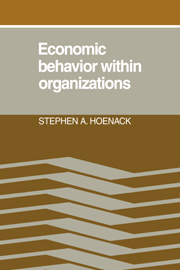Book contents
- Frontmatter
- Contents
- Preface
- 1 Introduction
- 2 Definitions and determinants of employees' discretion over an organization's resources and production
- 3 Employees' resource diversions and employers' imposition of resource responsibility
- 4 Short-run resource allocation under fixed budgets
- 5 Short-run resource allocation in response to demand: the cases of an employee, a private corporation, and a private nonprofit organization
- 6 Legislative demand and short-run price and output of the public organization
- 7 Employees' investment behavior and implications for suborganization
- 8 Equilibrium behavior of public and private organizations in the first long run
- 9 The demand and supply of nonmarket resource allocation
- 10 A brief summary and proposed directions for further work
- Notes
- References
- Core definitions
- Index
5 - Short-run resource allocation in response to demand: the cases of an employee, a private corporation, and a private nonprofit organization
Published online by Cambridge University Press: 05 November 2011
- Frontmatter
- Contents
- Preface
- 1 Introduction
- 2 Definitions and determinants of employees' discretion over an organization's resources and production
- 3 Employees' resource diversions and employers' imposition of resource responsibility
- 4 Short-run resource allocation under fixed budgets
- 5 Short-run resource allocation in response to demand: the cases of an employee, a private corporation, and a private nonprofit organization
- 6 Legislative demand and short-run price and output of the public organization
- 7 Employees' investment behavior and implications for suborganization
- 8 Equilibrium behavior of public and private organizations in the first long run
- 9 The demand and supply of nonmarket resource allocation
- 10 A brief summary and proposed directions for further work
- Notes
- References
- Core definitions
- Index
Summary
This chapter separately analyzes the short-run resource allocation in response to demand of an employee, a private corporation, and a private nonprofit organization. The external demands for private organizations' outputs are taken as given and a managing employee's demand for his employee's output is derived. Based on the analysis of Chapter 4, Section A derives the employer's and the employee's costs of each rate of the employee's delivered output. Section B analyzes an employee's supply behavior in response to a managing employee's demand. Sections C and D respectively analyze the supplies of private corporations and private nonprofit organizations in response to their external demands.
Costs to the employer and to the employee of the employee's delivered output and simplifying assumptions about these costs
This section applies the analysis of Chapter 4 to derive the costs to an employer and to his employee of each rate of the employee's delivered output. Although the employee might not supply part of his output to his employer or to other parties whose receipt of this output benefits his employer, I ignore such quantities (i.e., amounts put to personal use, wasted, or supplied to other parties) in order to simplify the exposition. The exposition is also facilitated by the assumption of a single output. An employee's output can either be a separate intermediate or final output or his determinate contribution to such an output.
- Type
- Chapter
- Information
- Economic Behaviour within Organizations , pp. 113 - 139Publisher: Cambridge University PressPrint publication year: 1983



